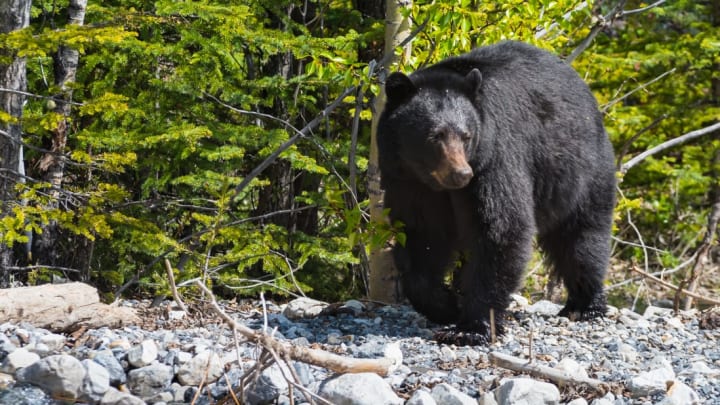What was once a rare sight—a bear wandering outside its den before springtime—has become increasingly common, thanks to climate change. As The New York Times reports, warming temperatures are waking American black bears from hibernation earlier than ever, and in some cases, preventing them from settling down for the winter in the first place.
Hibernation is a vital part of the black bear's life cycle. When awake, a bear must consume at least 11 to 18 pounds of food per day to maintain a healthy body weight. Withdrawing for the winter allows it to survive the food scarcity that comes with the colder months.
But as climate change promotes certain extreme weather patterns in the western U.S., the region's black bear population has begun to act differently. Last year the Pine Nut Mountains in Nevada saw unusually high levels of snowfall, and the excess moisture produced an abundant pine nut crop. This past winter, snowfall in the area hit near-record lows, leaving the pine nuts exposed on the ground for a longer period. The prolonged access to food in the area meant some bears started hibernating later or just never got around to it.
Many of the bears that did eventually crawl into their dens were woken up ahead of schedule this year. According to a 2017 study, for every 1°C that minimum winter temperatures rise, bears hibernate six days fewer. In January 2018, temperatures in the Pine Nut Mountains reached 5.4°C above the 20th-century average for the region.
Some years bears emerge from hibernation during droughts, which are exacerbated by climate change, and food is hard to come by. When that's the case, bears may end up on private property, raiding people's trash cans and bird feeders and sometimes breaking into their homes. Fatal bear attacks on humans aren't common: The more likely scenario is that the so-called problem bear will be euthanized. Bear management groups will often try other strategies, like capture and release and aversive conditioning, before resorting to this option. Nonetheless, dozens of bears are euthanized by states each year.
Black bears aren't the only ursine species being forced to adapt to global warming. In the Arctic, polar bears are losing the sea ice they need to hunt marine mammals, and many of them are moving onto land in search of prey. Climate change is pushing both species of bears toward human-populated territory, which means conflicts between the bears and people will only increase from here.
[h/t The New York Times]
